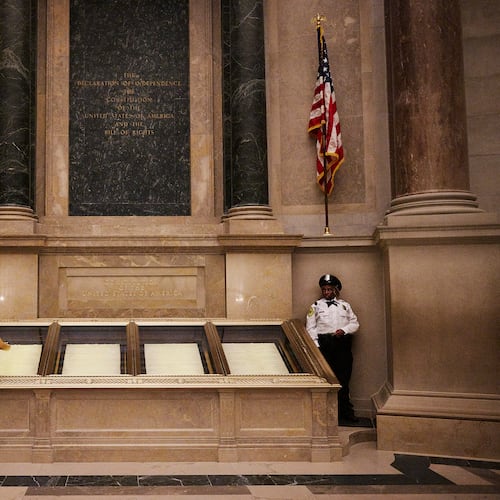In March 1965, Black civil rights activists led by Rev. Martin Luther King Jr. marched in Alabama to protest prejudice and demand equal rights for all. Members of the Jewish community, among them prominent religious leaders such as Rabbi Abraham Joshua Heschel, marched at their side, recognizing the injustice and understanding -- 20 years after the horrors of the Holocaust -- that silence in the face of bigotry was simply not an option.
I had the privilege last month of visiting the symbolic Edmund Pettus Bridge in Selma, Ala., the site of brutal police beatings on the day now known as Bloody Sunday. My visit was part of a wider tour of the South aimed at listening and learning about the history of Black people in this country and strengthening ties between Israel and the African American community.
During that trip, my first as Ambassador to the United States, I realized that five decades after the civil rights movement, it is once again time for all of us to unite against racism and hatred. Discrimination based on skin color or religious beliefs is still rampant throughout the world. Getting to know one another better and working together is the only way to combat ignorance and empower this holy battle.
I was accompanied on my trip, which also included stops in Charleston, S.C., and Montgomery, Ala., by African American leaders from across the country. As each participant shared with me their deeply personal stories and experiences about being Black in America, what struck me most profoundly was -- despite the superficial difference between us – our humanity and basic instinct to survive, are essentially the same.
As the grandson of Holocaust survivors, I strongly identified with the need to keep the memories of our ancestors alive and learn lessons from their suffering. At the Magnolia Plantation in Charleston, our guide retold the harrowing stories of enslaved Africans. We saw their miserable living conditions and heard how adults and children were forced to work backbreaking hours.
While I hesitate in comparing anything to the horrors endured by victims of the Holocaust, on some level I could relate to the tales that I heard. Slaves were not viewed by their cruel masters as human beings. They were reduced to nameless commodities that could be worked, abused and discarded.
When I learned about South Carolina’s vibrant Geechee and Gullah people, who have succeeded in maintaining their unique traditions and practices despite displacement and mistreatment, I recalled the Jewish communities who, throughout the world and throughout the centuries, have held on tightly to their religious traditions and practices. Xenophobia has the ironic ability to strengthen people and push them closer together.
Also in Charleston, at the Mother Emanuel Church, I was extremely moved hearing about the community’s incredible resilience following the 2015 murder of nine people by a white supremacist. I was shocked to hear how the authorities treated this cold-blooded killer with compassion even though he had just committed such a heinous and unforgivable crime.
Despite their pain and mistreatment, church members did not hesitate in reaching out to the Jewish community in Pittsburgh three years later, following a similar hate crime in the Tree of Life Synagogue. That support and friendship really touched me. Working together, taking time to really understand each other, is the only way forward for all of us. As Dr. King once said: “Injustice anywhere is a threat to justice everywhere.”
One of my goals as Israel’s ambassador is engage with all sectors of American society, but it is no accident that I began my journey with the African American community. I truly believe that God guides us to certain points in our lives and I know that both our people draw strength from the Bible whenever we face hard times. As I move forward in my role as a public servant, I know that I will now also draw strength from everything I learned during my trip to the South.
One of my final stops was at the Dexter Avenue King Memorial Baptist Church in Montgomery. Still alive with King’s enduring inspiration, I will close with a final quote from this great man:
“Let us all hope that the dark clouds of racial prejudice will soon pass away, and that in some not too distant tomorrow the radiant stars of love and brotherhood will shine over our great nation with all their scintillating beauty.”
Gilad Erdan is Israel’s Ambassador to the United States and to the United Nations. He previously served in the Israeli government in various ministerial positions for more than a decade, including in the security cabinet and in Israel’s Knesset.
About the Author
Keep Reading
The Latest
Featured

